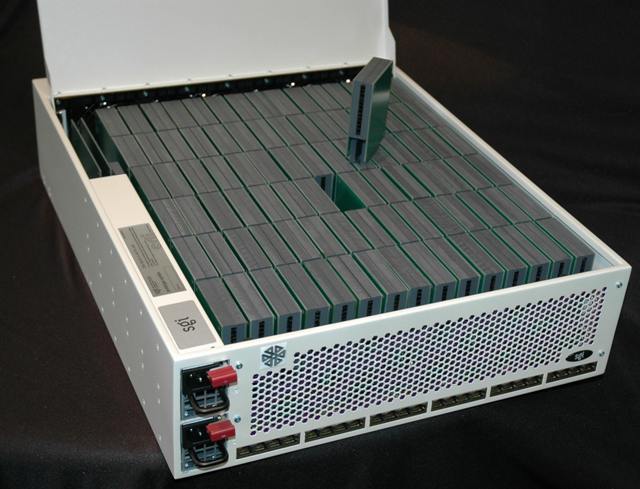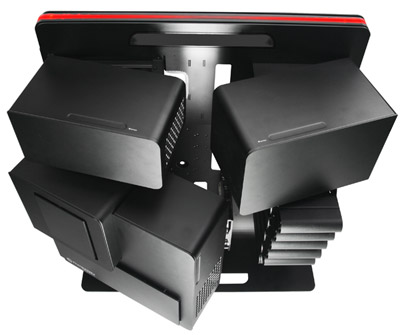[2023]
[2022]
[2021]
[2020]
[2019]
[2018]
[2017]
[2016]
[2015]
[2014]
[2013]
[2012]
[2011]
[2010]
[2009]
December
November
October
September
August
July
June
May
April
March
February
January
[2008]
[2007]
[2006]
[2005]
[2004]
[2003]
[Fri Oct 30 16:08:38 CET 2009]
I must start with a disclaimer: I've been working for Silicon Graphics since 2000. Back in the days, it was an exciting company to work for. We were doing really cool stuff. We were on the edge, and the feeling was great. Then, we lived through quite a few tough days, the spirit sunk and lots of people made sarcastic comments about ours prospects for survival. To put it mildly: it has been a roller-coaster ride. And yet, I've never seen so many extremely knowledgeble (and cool, and approachable) people working under one roof. Some recent articles and announcements make me think that perhaps we still have the mojo. I'm referring to the annoucement of our new Octane III personal supercomputer and (this other one is still under development) the SGI Molecule. This last concept allows for 5,000 Atom chips to run in just one 3U rack computer. SGI: bringing supercomputing to the masses. Perhaps there is a reason to hope, after all.
{link to this story}

[Fri Oct 30 15:53:55 CET 2009]
According to Information Week, Eric Schmidt, Gogle's CEO, imagines a new era of mobile supercomputers. Truly, it is no different than what we have been referring to as convergence for so many years. Nevertheless, the vision is intriguing:
I'm not so convinced that the mobile phone will be the most important form factor in the near future, although it definitely is starting to look that way. They are getting easier to use, people can browse the web with them, access their email, etc. The spread of the touch screen has contributed towards it, of course. It made it way easier to take notes, reply to your email or enter text for whatever other reason. Still, it's sort of clunky for that purpose. In order for the phone to finally become the key device in our lifes, voice recognition still needs to improve a lot. The day that happens, I can see it taking over. In the meantime, perhaps other devices (the netbook? the tablet PC?) will have a chance to win our hearts. I was really happy reading science articles on my Eee PC while riding the bus yesterday. It's something I couldn't have done on a mobile phone. {link to this story}"A billion people on the planet are carrying supercomputers in their hands," Schmidt said in a conversation with Fusion-io CEO David Bradford. "Now you think of them as mobile phones, but that's not what they really are. They're video cameras. They're GPS devices. They're powerful computers. They have powerful screens. They can do many many different things, and oh, by the way, you can talk on them too. That's what the mobile phone of today is."
[Tue Oct 27 16:06:09 CET 2009]
So, what's next after the social networking craze? Google appears to think it may be making the social network more accessible. They recently introduced Google Social Search on their blog, as a part of the Google Labs project. And what is it? Simply put, it's a tool that allows you to find content not only on the web, but also among your online social circle. How does it do this? Basically, whenever you search for a particular term (say, "chinese food"), it will also display relevant entries from your friends' blog pieces, comments and posts to sites such as Facebook or Twitter. As is the case with other Google experiments, users will ultimately decide the fate of the project. If people find it useful, chances are the company will keep it around. In principle, I must say the idea sounds intriguing.
Incidentally, while perusing the PhysOrg website, I also came across another interesting project, although this other one is not related to Google: the beta version of WOWD has been released. And what is WOWD? It's a search engine that allows you to find out about the latest trends on the Net. I'm just not sure how they distinguish between a trend and a popular website or document, which is what Google uses to judge the relevance of a website after all. In any case, innovation is good. Let a thousand flowers bloom and may the end user decide what is worth keeping. {link to this story}
[Tue Oct 13 18:57:30 CEST 2009]
Amid all the garbage that one finds on the web about why Linux didn't take over Windows just yet, there are also some good, constructive pieces that go beyond the usual pro- or anti-Linux rant. Tanner Helland's 10 Days of Ubuntu 10.10 Feature Requests is one such piece. The ten features that he includes on his request list make perfect sense: a music player that doesn't suck, great package management experience, improved visual aesthetics, real Wine integration, a good and simple backup tool, etc. The main complaint against Linux that Helland makes is (at least in my view) the annoying presence of "paper cuts" (i.e., little issues that make the whole experience a bit unpleasant. In this sense, he refers to a project (the One Hundred Paper Cuts Project, put together by the Ubuntu folks, who are contributing quite a bit to the overall Linux desktop experience, definitely more than Red Hat and SUSE) that I had never heard of but that makes a lot of sense. As Helland himself explains:
In other words, the "paper cuts" referred to above. But what are these "paper cuts"? Helland goes on to give us a few examples:There is no "one flaw" that explains why Linux has yet to reach mass market adoption. People can talk about any number of individual problems —be it hardware support, marketing, stability, whatever— but at the end of the day it is impossible to argue that either Windows or OSX surpasses Linux in all of these areas. For every person who argues that hardware support is better under Windows, another person will argue that it's bette3r under Linux, and the same could be said for any other macro-level problem.
So if there is not a "master flaw" that keeps Linux distros from becoming mainstream desktop OSes, what are other possible explanations? In my opinion, the primary problem is not any one failure in particular, but the sum total of a number of very small, almost-consequential-on-an-individual-basis problems.
I'm pretty sure any of us could add a few more items to the list... which is precisely the best proof in favor of the argument. {link to this story}
- F-Spot puts photos in Photos folder not Pictures folder
- Changing workspaces via scrollwheel on desktop is problematic, especially when using touchpad
- Default folders inside Home Golder (e.g. Document, Music) should have special icons/emblems
- "Auto eth0" confusing for most people
- The thumbnail of an image should not be bigger than the image itself
- Spellcheck in Gaim, Evolution, Gedit etc doesn't recognize "Ubuntu".
- Annoying beep on shutdown using "System -> Shut down..."
- "Open With" Nautilus list is unsorted
[Thu Oct 8 15:20:48 CEST 2009]
And how about this? The folks at GRO Architects have come up with a concept design for a series of walkways and other public spaces inside power-generating tidal turbines. It does sound far-fetched and futuristic, sci-fi like. That must be the reasonwhy it loks so cool too.
{link to this story}
[Thu Oct 8 15:16:21 CEST 2009]
Now, this is interesting. The guys over at kernel.org have put together a few images that make it possible for you to boot into a fully-fledged Linux distribution over HTTP. I don't know how I feel about it from a security standpoint —not to talk about performance concerns—, but the idea is definitely way cool. I may give it a try some day. {link to this story}
[Fri Oct 2 18:04:42 CEST 2009]
A friend sent me this link to a page about a computer system designed collaboratively by a company named Thermaltake and BMW Group DesignworksUSA. Some cool stuff.
{link to this story}
